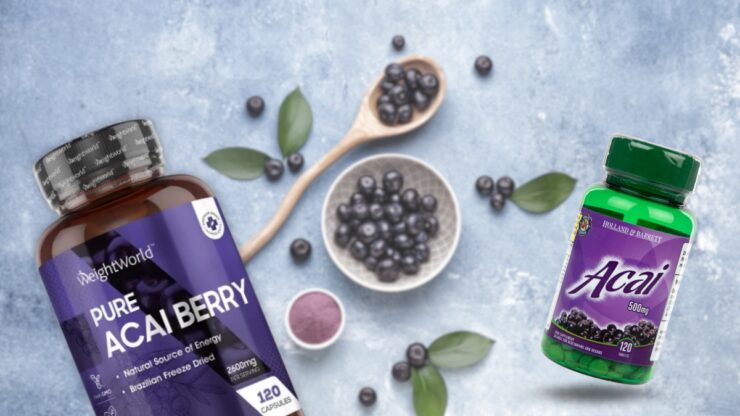Acai berries hailed as a “superfood” and celebrated for their high antioxidant content, have taken the world by storm. These dark purple, grape-like berries come from the acai palm tree native to Central and South America. They have been embraced by the health-conscious community, with acai bowls and supplements popping up in health food stores, cafes, and restaurants worldwide. However, amidst the hype, there is a darker side to these popular berries.
This comprehensive blog post will delve into the major side effects of acai berries and acai berry supplements, exploring the potential risks and debunking some of the myths surrounding this trendy fruit. Our aim is to arm you with valuable knowledge, enabling you to make well-informed decisions about whether or not to include acai in your diet.
Allergic Reactions
While acai berries are generally considered safe for consumption, some individuals may experience allergic reactions. If you have a known allergy to pollen or are sensitive to other types of berries, you may be more susceptible to developing an allergy to acai.
Symptoms can range from mild (itchy mouth, skin rash, or hives) to severe (difficulty breathing, swelling of the face, lips, or tongue, or anaphylactic shock). If you experience any of these symptoms after consuming acai berries, seek medical attention immediately.
Gastrointestinal Issues

They have been linked to gastrointestinal issues such as bloating, gas, and diarrhea. While these side effects are typically mild and short-lived, they can be uncomfortable and inconvenient. The fiber content in acai berries may be responsible for these digestive symptoms, as fiber can cause gas and bloating when consumed in large quantities. To minimize the risk of gastrointestinal discomfort, consider starting with a small serving of acai and gradually increasing the amount as your body adjusts.
Impact on Blood Sugar Levels
Acai berries have been praised for their potential to help regulate blood sugar levels. However, there is a lack of concrete scientific evidence supporting this claim. In fact, some studies suggest that consuming acai products may cause blood sugar levels to spike, especially when the berries are consumed in the form of juice or supplements with added sugars. Individuals with diabetes or blood sugar issues should monitor their blood sugar levels closely and consult with a healthcare professional before including acai in their diet.
Interaction with Medications
They can interact with certain medications, potentially reducing their effectiveness or increasing the risk of side effects. Some medications known to interact with acai include:
- Anticoagulants (blood thinners) like warfarin: These berries may increase the risk of bleeding when taken with these medications due to their high levels of vitamin K.
- Cholesterol-lowering drugs (statins): It may interfere with the absorption of these medications, reducing their effectiveness.
- Antidepressants: They contain compounds called MAO inhibitors, which can lead to a dangerous spike in blood pressure when consumed alongside certain antidepressants.
If you are taking any of these medications or have concerns about potential interactions, consult your healthcare provider before incorporating acai into your diet.
The Impact of Acai Cerry Cultivation on the Environment and Local Communities
Their cultivation has both positive and negative impacts on the environment and local communities. Acai palm trees are native to the Amazon rainforest and play an important role in the ecosystem by providing food and shelter for a variety of animals. However, their increasing demand has led to deforestation and the destruction of natural habitats in the Amazon. Commercial production has also raised concerns about the exploitation of local communities.
Many of the small-scale farmers and indigenous communities who cultivate acai berries may not receive fair compensation for their work, while large corporations profit from the sale of acai products. To minimize the negative impacts of acai cultivation, it is important to support sustainable and responsible farming practices, such as agroforestry and organic farming.
Consumers can also make informed choices by purchasing products that are certified organic and fair trade. By supporting ethical and sustainable production, we can help to ensure that their cultivation benefits both the environment and local communities.
Acai Berry Supplements: Quality Matters

When it comes to acai berry supplements, not all products are created equal. The quality and safety of acai supplements can vary widely, with some containing contaminants, additives, or fillers. To ensure you are purchasing a high-quality, safe product, follow these guidelines:
- Look for reputable brands: Choose supplements from well-established companies with a solid reputation for quality and safety. Research the brand’s history and read customer reviews to get a sense of its reliability.
- Check for third-party testing: Supplements that have been independently tested and verified by a third party for purity, potency, and safety are generally more reliable. Look for certification seals or statements on the product label indicating third-party testing.
- Read the label carefully: Examine the ingredient list to ensure it contains only acai berry extract and does not include any unnecessary additives, fillers, or artificial ingredients. Additionally, look for a supplement with a standardized amount of acai extract, as this can help ensure consistent dosing.
- Consult with a healthcare professional: Before taking any new supplement, it’s always a good idea to consult with a healthcare professional to discuss your individual needs, potential interactions, and the appropriate dosage.
A Comparison of Acai Berries to Other Popular Superfoods
They have gained immense popularity recently, touted as a superfood due to their high antioxidant content. However, it is important to understand that there are other superfoods with similar or even higher nutritional value. For example, blueberries are also high in antioxidants and are readily available in most grocery stores. Kale is another superfood that is often touted for its high nutritional content. It is rich in vitamins A, C, and K, as well as iron and calcium.
Additionally, chia seeds are a great source of protein, fiber, and omega-3 fatty acids. While they are nutritious food, it is important to consider their availability and cost compared to other superfoods. For example, they are not typically found in most grocery stores and may be more expensive than other superfoods that are more readily available.
Tips for Safely and Responsibly Consuming Acai Berries

They have gained popularity in recent years due to their potential health benefits, including high antioxidant content and anti-inflammatory properties. However, it is essential to consume acai berries safely and responsibly to avoid any adverse side effects. Here are some tips to keep in mind:
- Purchase them from reputable sources to ensure their quality and purity.
- Wash the berries thoroughly before consuming or using them in a recipe.
- Consume them in moderation, as excessive intake may cause digestive issues, headaches, or allergic reactions.
- Consult with a healthcare professional before incorporating acai berries into your diet, particularly if you have any medical conditions or take medication.
- Avoid consuming ones that have added sugars or other ingredients that may compromise their nutritional value.
- Consider incorporating them into a balanced diet that includes a variety of fruits, vegetables, whole grains, and lean proteins.
By following these tips, you can safely and responsibly consume acai berries and potentially reap their health benefits. Remember to listen to your body and adjust your intake as needed.
If you found this text useful, please read our text about the side effects of Eating too many dragon fruits.
FAQs

How can I include acai berries in my diet?
They can be consumed in various forms, such as fresh or frozen fruit, juices, smoothies, or supplements. They are commonly used as a base for acai bowls, combined with other fruits, granola, and yogurt.
Are acai berries high in calories?
They are relatively low in calories, with approximately 70 calories per 100 grams. However, products like smoothie bowls can be higher in calories due to added sugars and toppings.
Can I eat acai berries during pregnancy?
While their moderate consumption is likely safe during pregnancy, it’s best to consult your healthcare provider before making any significant dietary changes or taking supplements during this time.
Are acai berries safe for children?
They are generally safe for children when consumed in moderation as part of a balanced diet. However, it’s important to monitor for any signs of an allergic reaction or gastrointestinal discomfort. Consult your child’s healthcare provider before introducing them to their diet.
Q: Can acai berries be eaten raw?
A: While they can be eaten raw, they are not commonly found in their raw form outside of their native region due to their short shelf life. They are typically consumed as frozen pulp, dried, or in supplement form.
Conclusion

Acai berries and acai berry supplements have been touted for their numerous health benefits, including their antioxidant content and potential ability to aid in weight loss, boost energy, and support overall well-being.
However, it’s crucial to be aware of the potential side effects and risks associated with these products. Allergic reactions, gastrointestinal issues, impact on blood sugar levels, and interactions with medications are some of the major side effects of acai berries and acai berry supplements.
The quality of these supplements can vary significantly, making it essential to choose a reputable brand and seek third-party testing to ensure the product’s safety. While they can be a delicious and nutritious addition to your diet, it’s important to consume them in moderation and be mindful of potential side effects.
As always, consult your healthcare professional before making any significant dietary changes or starting a new supplement regimen. Armed with this knowledge, you can make well-informed decisions about whether or not to include acai berries and acai berry supplements in your wellness journey.

